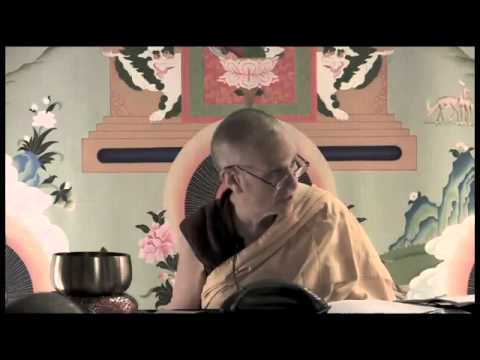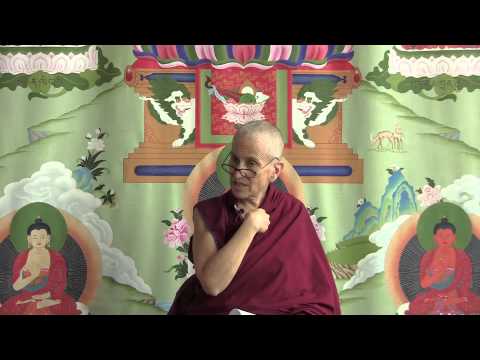Re-writing the 12 steps, 1-7
Fourth in a series of talks suggesting how to modify the steps in a 12-step program to fit into a Buddhist framework.
- Re-writing the 12 steps from a Buddhist perspective
- How to rely on refuge in the Three Jewels, our inner wisdom and compassion, and advice from spiritual mentors.
Buddhism and the 12 steps 04 (download)
So to continue with Buddhism and the 12 steps… So he sent in a list of the Codependents Anonymous 12 Steps. Or CoDA.
Step 1
We admit we are powerless over others, that our lives have become unmanageable.
Definitely. Buddha’s been telling us that for a long time.
In going through these 12 I want to kind of talk about how to make them particularly Buddhist, because that was his question.
Step 2
We came to believe that a power greater than ourselves could restore us to sanity.
Now here we have to understand “power greater than ourselves.” From a Buddhist perspective if you’re looking for someone or something external to you to fix your problems it’s not going to work.
So, “power greater than ourselves…” Maybe we could say… We could talk about the true path and true cessations, the Dharma refuge. That’s a power greater than ourselves that could restore us to sanity. So we want the true cessations and true paths because when we actualize that then our mind is truly healed and healthy.
And then the Buddha is the one who teaches that. The Sangha are the ones who aid us in practicing. So maybe you could say here, “I came to believe that refuge in the Three Jewels could restore me to sanity.” Yes? If we reword it like that?
Step 3
Then three: We made a decision to turn our will and lives over to the care of “God” as we understand “God.”
Well, if you understand “God” as Dharma practice and developing your own inner wisdom and your own compassion, then that works. And here when it says, “Our will.” I’m not quite sure—our will. Maybe if we say, “We made a decision to turn our choices and our lives over to the care of wisdom and compassion as taught by the Buddha.” How would that be?
Audience: I think that’s about letting go, from the co-dependent point of view, also, our will. Trying to make people change, trying to make something happen.
Venerable Thubten Chodron: Okay, so you think the will is especially important in co-dependent things. Because if you’re co-dependent you’re trying to…
Audience: Stop trying to change people, make them what you want them to be.
Step 4
VTC: Okay. And then four: Make a searching and fearless moral inventory of ourselves.
Right on. That is the third of the Seven Limb Prayer. And then doing that with the Four Opponent Powers. Very very important.
So it’s interesting that that comes at the beginning of the 12 steps, and similarly in our Dharma practice we start purification right from the beginning, and then continue it on through.
Step 5
Then, five: We admitted to God, to ourselves, and to another human being the exact nature of our wrongs.
So here, I would again say, “We admitted in the presence of the Buddha, Dharma and Sangha.”
Or, “We admitted to the Three Jewels, to ourselves, and to another human being” — who we trust, I would add that in — “the exact nature of our destructive actions.” How’s that?
So that is yes, definitely. Completely in line with the Buddhadharma.
Step 6
Then six: We were entirely ready to have God remove all these defects of character.
That one needs some work. Because even if you switch God, put in Buddha, or even put in the Three Jewels… That they’re going to remove our character defects? No. So, “We’re entirely ready to have the Three Jewels and our spiritual mentors teach us and guide us so that we can do the practice that removes our mental afflictions.”
Yes, we’re entirely ready. So we have to be receptive to doing this. Which means that we’ve looked at our lives and we’re fed up. You know? We’re fed up with continuously creating negative karma and experiencing suffering in samsara. And we really want to get rid of the ignorance and the afflictions that cause all of this.
Okay, so, “We are entirely ready to request the Three Jewels and our spiritual mentors (that’s important, too) to teach us the methods and to guide us in the practice so that we can remove our afflictions and negativities.” How’s that?
Step 7
Humbly ask God to remove our shortcomings.
That one just got bounced. That doesn’t work in Buddhism at all.
So, “humbly.” I think humbly is very important. Not like, “Well now I’ve got it all together and I’m going to fix myself and it’s all settled and taken care of.” But humbly, because we know our mind is overwhelmed by afflictions and karma.
“We request inspiration from the Three Jewels so that our minds become receptive to their enlightening activities.”
Audience: I was thinking too maybe it could be that we open ourselves to the feedback from a spiritual mentor. Maybe we say “I’m going to follow the advice, the training…”
VTC: Okay, so let’s make it two things. What was the one I just said? “Humbly to request the Three Jewels for their inspiration so that we can be receptive to their enlightening activities, and humbly make ourselves receptive to the instructions and advice of our spiritual mentors.”
I think that’s a good place to stop for today. We’ll do the others tomorrow.
Venerable Thubten Chodron
Venerable Chodron emphasizes the practical application of Buddha’s teachings in our daily lives and is especially skilled at explaining them in ways easily understood and practiced by Westerners. She is well known for her warm, humorous, and lucid teachings. She was ordained as a Buddhist nun in 1977 by Kyabje Ling Rinpoche in Dharamsala, India, and in 1986 she received bhikshuni (full) ordination in Taiwan. Read her full bio.


